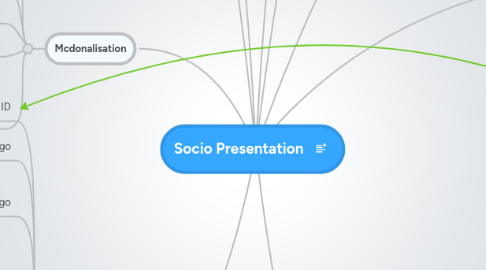
1. Stanford Prison Experiment
1.1. Why this result?
1.2. Sociogical meaning?
1.3. Any similar situation?
1.3.1. Holocaust and the Nazi Germany
1.3.1.1. Distribution of Roles SS/prisoner-Garde/prisoner
1.3.1.1.1. WheneverJews were made capos in concentration camps they were just as cruel to other prisoners as the Nazis were. We could expect simillar o happen in SPE, whenever the roles of inmates and prisoners were reversed
1.3.1.2. Multitasking
1.3.1.3. Control
1.3.1.3.1. Absolute leadership of the dictator and of the guards in the SPE
1.3.1.4. Brainwashing
1.3.1.4.1. Population easily taught by propaganda that Jews are scum of the earth.
1.3.1.4.2. Subliminal Messages - people are controlled without even knowing it - made believe certain things like Jews are bad - smells pictures used in advertissements
1.3.2. Stockholm Syndrome? My dad's idea
2. Mcdonalisation
2.1. Control
2.2. Efficiency
2.3. Calculability
2.4. Predictability
2.5. Bureaucracy
2.5.1. Weber and bureaucracy
2.5.1.1. "An organisational model rationally designed to perform complex tasks efficiently"
2.5.1.2. Weber's 6 characteristics of bureaucracies
2.5.2. Irrational bureaucracy
3. Freud
3.1. ID
3.1.1. Human beings basic drives-pleasure and aggression. Operated at a level of unconscious mind
3.2. Ego
3.2.1. A persons conscious efforts to balance natural, pleasure seeking drives with the demands of society.
3.3. Superego
3.3.1. Operation of culture within the individual- we can see why we can’t have everything we want.
3.3.2. Cultural values and norms, in the form of conscience-define moral limits.
3.4. personality development
3.4.1. conflict between Id and superego ongoing
3.4.2. Development of superego-moral concept or right and wrong
3.4.3. Sublimation- transforms selfish drives into socially acceptable activities. Eg. Aggression gives rise to competitive sports.
3.4.3.1. Sublimination sort of linked to the SPE- for the "guards" it was socially acceptable to treat the prisoners as they did because that was essentially their job to keep control.
3.4.4. Repression-culture operates to control human drives.
3.4.5. moral concept of right and wrong
3.4.6. comprimise
3.5. Freud
3.5.1. Workings of the repressed unconscious: people’s lives are partly shaped by emotional experiences, traumas etc
3.5.2. We don’t know why we do certain things
3.5.3. Freud and the Oedipus complex
3.5.3.1. Father becomes part of the superego-authority figure
3.5.4. Becoming social: how to cope with all our desires and becoming a socialized adult with a conscience
3.5.5. We internalize social norms and childhood experiences have lasting impact on socialization. (wanted to also link this/ put an arrow to mc Donalization but not too sure how to do that!) will explain why i think its linked in person.
4. Micro-sociology
4.1. all the topics below have micro-socioogy in common. they are all part of it
4.1.1. the importance of situations in building up the social notions of identity, body and emotion.
4.1.2. we may like to think of ourselves as 'free individuals' micro sociology shows us how, through everyday encounters and feelings, the social is present, helping to shape outcomes.
4.1.3. socialization process in helping to shape who we become during our lives
5. shows how people adapt to the different roles they are given in life ,indeed the individuals acted in a way that they thought was required. This suggests that a human being will adapt to any new given role - and that in a very short amount of time in fact .
6. Goffman (performances)
6.1. What is it?
6.1.1. Theory that each individual is both an actor and audience in life's theatre , - able to change his performance depending on his audience and uses different props to support his performance
6.1.1.1. . setting : prison austere , violent , scary . appearance : humilating and uncomfortable for prisonners and autoritarian and mean for gards . manner : obedient for priosonners and severe ( maybe sadistic) for gards . , front, and personal front
6.2. Possible link with Standford?
6.2.1. students as actors , playing the role of either inmate or gard "behaving in a way that they thought was required, rather than using their own judgment and morals"
6.2.1.1. here the line between cynical or sincere performance is thin ( i think , to be discussed )
6.2.1.2. If the performer does not conform to some of the ideals of society, or does not present himself as such, he risks being ostracized by the audience and not taken seriously, as it was the case for the new prisonner , that came later in the experiment , and did not conform to the others - who did not cooperate
6.3. Socio meaning?
6.4. Link to organisation , since this experiment was an institutionalised one ,it made the role seem more real , more legitimate , so that the acting was taken TOO far even priest and lawyer played their professional roles instead of human role - even zimbardo let himself sway into prison director instead of scientist - the gards were so caught up into it that they became sadistic .
6.5. Presentation of self- an individual's effort to create specific impressions in the mind of others.
7. Theory of Organisation
7.1. What is it?
7.1.1. Formal organisations
7.1.1.1. Bureaucracies
7.1.1.2. Formal Organisations
7.1.1.2.1. Utilitarian organisations
7.1.1.2.2. Normative organisations
7.1.1.2.3. Coercive organisations
7.1.1.2.4. New node
7.1.2. Social circles
7.1.2.1. Primary groups
7.1.2.1.1. Family, strong links.
7.1.2.2. Secondary groups
7.1.2.2.1. Work or university groups, easy to break
7.1.2.2.2. Large, organized to achieve goals efficiently
